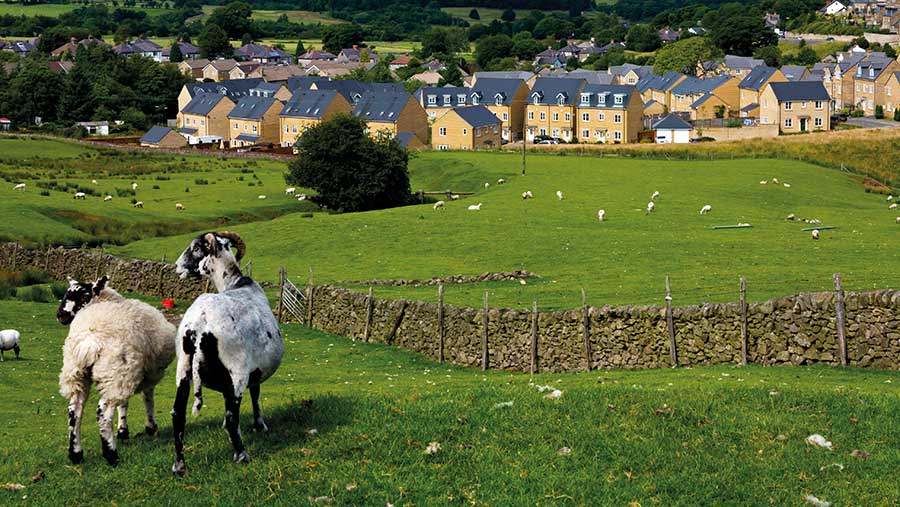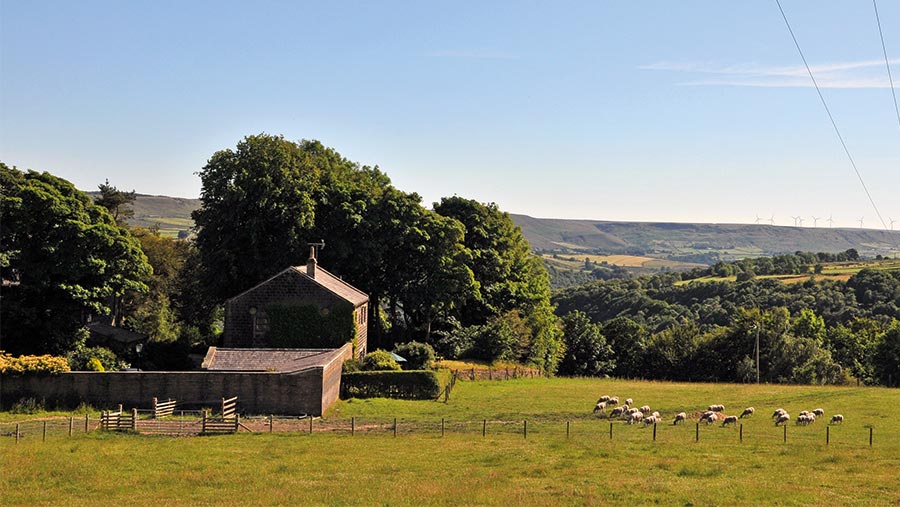Top tips for farmers on avoiding inheritance tax pitfalls
 © Robert Morris/Alamy Stock Photo
© Robert Morris/Alamy Stock Photo
An inheritance tax investigation can be a long and stressful process, so proactive planning to minimise the risk of queries is time well spent.
Forward planning can also reduce the risk of families being forced to sell property and assets to fund an unexpected inheritance tax (IHT) liability.
There were more than 4,250 IHT investigations by HMRC in 2021-22, one-fifth more than the year before, according to new figures obtained by NFU Mutual.
Only a few hundred of these are likely to have involved farmers but advisers warn there has been more activity from HMRC on claims for agricultural property relief (APR) and other reliefs available to farming businesses.
See also: HMRC investigations – how they arise and how to handle them
Laura Wylie and Chris Watts, tax specialists with accountant Old Mill, and Sean McCann, chartered financial planner at NFU Mutual, offer some expert insight into the process and explain where problems can arise.
The process
Executors of an estate are legally obliged to file an IHT Return to HMRC when dealing with the estate of someone who has died.
HMRC’s trusts and estates department can open an investigation, either at random or because they want to query some of the information supplied.
“HMRC has substantial investigation powers if it suspects inheritance tax has been underpaid through error, omission or undervaluing assets,” says Mr McCann.
“It will check other information sources to build up a picture of the deceased and their financial affairs.
“This will include analysing bank statements, looking at income which may suggest the existence of undisclosed assets such as investments or property or significant foreign currency transactions.
“It will also look at outgoings such as gifts made in the seven years before death.”
A common trigger for queries will be the basis of the valuation of an asset, where HMRC may be concerned that it has been undervalued, says Mr Watts.
Others include queries on the occupation of the farmhouse, where there have been tenancies in place, or if any of the land is being used for non-agricultural purposes.
Investigations can take months – and sometimes years – to complete, and executors can be personally liable for any additional tax due if they distribute the estate before the tax position is resolved.
The interest rate HMRC charges on overdue inheritance tax is 6%, which can add a significant amount to bills. Penalties can also be charged for submission of inaccurate returns.
Farmhouses
There can be a simple assumption that everything on a farm will be covered 100% by APR but, in many instances, a farmhouse only attracts APR on a proportion of its value.
APR is available on the transfer of land and property that is being used for agricultural purposes, such as to grow crops or rear animals intensively, but is only available on the agricultural value of the asset.
Business property relief (BPR) may also be available to a farming business. This can be used to bridge the gap between the agricultural and open market value of land, but does not apply to farmhouses.
Nowadays, a farmhouse will have more appeal to the wider public as a dwelling, and will typically have a value over and above its suitability for use as a farmhouse.
Factors affecting the valuation include its size and character in relation to the rest of the farm.
For example, a small farmhouse in the middle of the yard with tractors passing the door is more likely to get 100% relief than a six-bedroom property surrounded by nice gardens.
“People assume there will be 100% APR against the farmhouse, but for many years HMRC has been arguing that the agricultural value may at times be only 70% or even 50% of its open market value,” advises Ms Wylie.
As a result, it is advisable when obtaining a valuation to make it clear to the valuer that it is a probate valuation, so they are aware they need to look at the potential difference between agricultural and open market value.
“It pays to get good advice beforehand, so when an estate return is submitted to HMRC you are prepared for any potential queries,” says Ms Wylie.
“People get panicky where they aren’t expecting a challenge. Plus, good advisers can help as they are able to have detailed and knowledgeable discussions with HMRC to come to an agreement.”

© Philip J Openshaw/Adobe Stock
Occupation of property and land
HMRC will also look for evidence that the house was being occupied for the purposes of agriculture.
They will want to see the occupant was actively involved in the business and the farmhouse was the place from which the business was managed.
“Where the deceased had let all their land out on a farm business tenancy and remained in the farmhouse, relief on the house is normally denied, which can mean an unexpected tax bill for the family,” warns Mr McCann.
“Similarly, where the farmer spent a prolonged period before their death living away from the farm in residential care, it can mean that relief is denied, even after a lifetime of farming.”
Importantly, if a property is under a binding contract of sale at the time of death, this means APR will not be available.
Diversified enterprises
Diversification carries the risk of land or property no longer qualifying for APR because it is not viewed as being in agricultural use.
This can make BPR more important in terms of mitigating IHT, but BPR will not be available if HMRC views the diversification as an investment rather than a trading business.
For example, solar farms have significant implications from an IHT perspective.
Where land is leased to an operator for a solar development, APR is not likely to be available as the land is no longer being farmed and BPR is unlikely to apply as the farmer will be receiving a rent.
“There is tax planning you can do to reduce the value of such land within an estate, such as a lifetime gift,” says Mr Watts.
“If the land affected is unlikely to go back into agricultural purposes, you can also transfer that land into a trust. However, it is important to get advice, so you can take appropriate steps before any lease is signed.”

© Rido Adobe Stock
Business structure
Businesses should maximise the IHT reliefs available by looking at how land and other capital assets which are used by the business are held.
Many farms are run as a partnership and if land and buildings are owned by partners individually and personally then the BPR available will be capped at 50%, warns Ms Wylie.
“However, if partners hold that land on trust for the benefit of the partnership, then the land is reflected on the balance sheet of the partnership and the value of BPR will increase to 100%.”
This will be significant where the open market value of land is significantly higher than the agricultural value and BPR is required to cover off anything that falls outside of APR.
Development potential
Land and buildings with development potential can have significant open market value.
Where the farmer continues to farm the land themselves and is still farming it at the time of death, BPR should be available on this increased value, but it will depend on the situation.
“HMRC often looks closely at these claims due to the sums involved,” says Mr McCann.
“Situations where the land has been let out on a farm business tenancy, or buildings were not being used as part of the trading business at the time of death, can see relief denied.
“Where the deceased owned land with development potential that they let on a grazing agreement, HMRC will want to see the agreement and other evidence to support a claim for BPR on the enhanced value.
“It may go as far as interviewing the grazier to check their activity on the land to ensure it was the owner, rather than they, who was farming the land.”
Insurance
Farmers worried about the potential of their beneficiaries being left with a large IHT bill can take life insurance cover.
This will provide a tax-fee lump sum to help pay any IHT bill. However, it’s important that life insurance policies are written in trust – if not, they will form part of the estate and be potentially taxed at 40%.
Plan early
It tends to be far cheaper to pay for upfront knowledge, rather than to go through an HMRC enquiry, concludes Mr Watts.
He recommends seeking professional advice when tax planning and using accountants and solicitors who understand what reliefs are available when applying for probate.
IHT pointers
- Keep paperwork in order, in case of queries by HMRC – bank statements, outgoings including investments, property-related transactions, gifts, significant foreign currency transactions
- Valuations are likely to be closely scrutinised
- Farmhouse occupation and extent of agricultural activity on land are key tests for relief
- Check the tax implications of diversification uses – restructuring in good time could help maximise relief
- Ownership structure of land is often personal rather than business, or a mix of both – understand how this affects potential relief claims
- Potential development land needs special attention to ensure correct structure and use for IHT relief
- Insurance can help to mitigate the impact of an IHT bill
